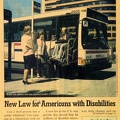THE DENVER POST / NATIONAL Friday: September 9, 1989
[Headline] Senate approves bill to guarantee rights of disabled
By Knight-Rldder News Service
WASHINGTON — An estimated 43 million America with disabilities won a major victory last night as the Senate approved a landmark bill aimed at moving them into the nation’s social and economic mainstream.
The Senate, on a 76-to-8 vote, passed legislation that would extend for the first time sweeping civil rights protections to persons with hearing impairments, epilepsy, AIDS and dozens of other physical and mental disabilities.
The measure, which now goes to the House for expected approval, would ban discrimination in the hiring of the disabled; require businesses, shops and transit systems to make their facilities more accessible to the wheelchair-bound; and force telephone companies to provide special operators for the deaf.
The bill was endorsed last month by President Bush, and administration lobbyists joined advocates for the disabled yesterday in opposing efforts to modify the legislation to meet business objections that it will be too costly to small firms.
Business leaders warned that the measure could put some employers out of business if.they were required to make expensive structural changes in their buildings to accommodate disabled customers and workers.
Critics also said the compliance provisions of the bill were vague and would result in years of litigation in federal courts over what constituted discrimination against the disabled.
Major provisions of the Americans with Disabilities Act would:
* Prohibit employers from discriminating against qualified job applicants with disabilities. Changes to accommodate the disabled in the workplace would be required unless they would cause an “undue hardship," a term critics say is too vague.
* Require new business establishments to be accessible to the disabled and require existing establishments be made accessible if the alterations are “readily achievable."
* Require new buses and trains to be equipped with wheelchair lifts.
* Require telephone companies to provide operators who could relay messages from the deaf to hearing individuals. Deaf persons can communicate with each other by telephone now by using Telecommunications Devices for the Deaf (TDDs), but can't communicate with people who don't have the TDDs.
“We’re not asking for special treatment," said Pat Wright, government affairs director of the Disability Rights Education and Defense Fund Inc. “Whether it’s putting a ramp in or providing a reasonable accommodation in employment, it makes you equal, not special."
The bill, as originally written, would have exempted Congress from its provisions — but that exemption was deleted during debate. And in another concession to the intense interest of the disabled in the measure, the Senate for the first time allowed an interpreter using sign language to translate the televised proceedings of the floor debate so that the deaf and hearing impaired could follow the action.
Extending civil rights protections to people with AIDS or the AIDS virus had been recommended by a Reagan administration commission on AIDS, but was opposed by President Reagan himself.
Bush, however, has supported the protection. The bill bars employment discrimination against persons with AIDS but does permit employers to deny jobs if the employee poses a significant risk of transmitting the infection to others.
However, homosexuals are not covered by the legislation. They can still be discriminated against solely on the basis of their sexuality.
After an inquiry by Sen. Jesse Helms, R-N.C., sponsors agreed to delete transvestites from nation protections.
Helms also raised questions about providing protection to schizophrenics, manic-depressives and psychotics, but their status remained intact in the measure.
- Created on
- Friday 12 July 2013
- Posted on
- Wednesday 22 July 2015
- Tags
- ADA, AIDS, business, civil rights, deaf, disability, discrimination, epilepsy, hearing impairments, major provisions of the ADA, mental disabilities, President George HW Bush, President Reagan, Senate, Senator Jesse Helms, wheelchair bound
- Albums
- Visits
- 2656
- Rating score
- no rate
- Rate this photo


0 comments